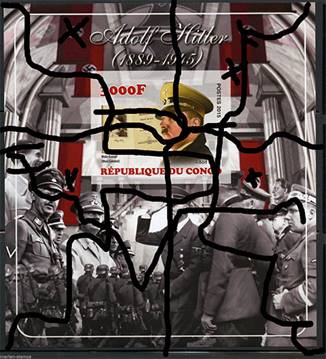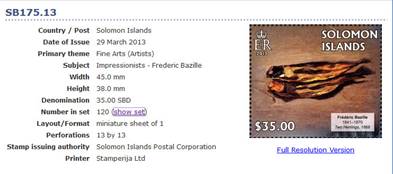Interview with Ms. Olfa Mokaddem
Program Manager "Philately and IRC" at the International Bureau of the UPU
Victor MANTA, PWO
(translated from French)
Introduction
The PWO asked some questions the new Program Manager "Philately and CRI” of the International Bureau (IB) of the Universal Postal Union (UPU), who was kind enough to answer them. We thank her for the answers provided and we publish below our questions, Ms. Olfa Mokaddem's kind answers, and our brief comments.

Questions, Answers and Comments
• PWO. When did you start your activity as the Program Manager “Philately and CRI" at the International Bureau of the Universal Postal Union? How was this change for you?
IB Reply:
- I took office as Head of the program "Philately and CRI” at the International Bureau of the UPU on the 07/02/2017.
- It is a new responsibility that I accepted with honor and pleasure at the same time, as I accepted all the responsibilities that I had in Tunisia within the Tunisian Post, as well as UPAP, but also with a lot of interest and seriousness.
• PWO. Thanks to the following link we learned that during the 2017 the UPU has issued a number of four Circulars on illegal postal stamps and that during the first three months of 2018 no new Circular has been published. Do you think that this number of Circulars sufficiently covers the illegal issues of this period of time?
IB Reply:
- The number of fewer circular does not reflect the reality, indeed the illegal issues represent a significant number compared with the overall number of issued stamps, but the requests for circular must come from the operators because it is about the principle of sovereignty, only the countries (and therefore the administrations issuing postage stamps in these countries) are decision-makers and sovereigns for their postage stamps. For this purpose, I refer to what Article 6 of the Convention stipulates (paragraph 2.2 "The postage stamp is an attribute of sovereignty ... ").
However, the International Bureau, as well as all the partners of the WADP, also have a role to play in this field, that of monitoring the international market, monitoring, coordination, training including the good philatelic practice and support for the designated operators.
PWO. Therefore Ms. Mokaddem is following the line of her predecessors, according to whom the Circulars are not in the direct responsibility of the BI of the UPU, but of the countries themselves. Although formally it is true, the fact that there is a strong decrease of Circulars denouncing the illegal stamps is the result of the reduction in the indispensable help from the IB, that has decreased a lot in the last decade. The final result is that from the 10 to 15 Circulars per year in the past today we have none of them.
• PWO. On the UPU page covering the period 2003 - 2015 the Philatelic Circulars are no longer accessible to philatelists as this has been for a long time. Will this deplorable situation change soon?
IB Reply:
- The International Bureau via the program “Philately and CRI” is aware of this situation, so a decision has been made to publish the Circulars on the WNS website which is accessible to the general public. I would like to remind you that all circulars issued from 2003 to 2017 are available on the UPU website to designated operators, who receive a written copy. In order to overcome this shortcoming that we have detected a long time ago, we have recently started public posting of this circular on the WNS site in descending order (2017-2016-2015) and we will continue it. All the circulars issued since 2003 will therefore be available to the general public very soon.
PWO. The fact that Circulars published on the UPU website became inaccessible to collectors was a VERY BAD idea. At time the years 2017 - 2015 only are covered on the site of the WNS, and the advancement is very slow.
The most amazing is the fact that NONE of the year 2018 Circular were published until September 2018, something that never happened before!
• PWO. The WNS numbering system of the World Association for the Development of Philately (WADP), started in 2002 and managed by the UPU, should have reduced the number of illegal issues coming permanently on the market philatelic. Has the UPU succeeded in this approach and has been the number of such issues effectively reduced?
IB Reply:
- The WNS is today the only online referencing tool of the stamps issued and declared official by designated participant operators. Each of the stamps on the WNS website has a certificate of authenticity, one copy of which remains at the UPU International Bureau, and another copy is sent to the designated operator concerned .
The objectives of the WNS since it was put into service in 2002, are to give the philatelists a catalog of all official issues and fight against illegal emissions made by counterfeiters without the agreement of the concerned designated operators.
The question of “ reducing the number of illicit emissions” is not solely the task of the WNS for many reasons:
• The WNS system is one of the tools of this fight,
• The WNS system does not include all designated operators because it's based on volunteering ,
• The fight against illegal emissions requires a joint effort between the various stakeholders in the field : designated operators (via good practices and the adoption of an adequate internal legal framework), traders, agents, the philatelic press, the FIP via the commission of the fight against the illicit and the counterfeits, ...,
To this end, the UPU and the WADP will also play an important role through the seminars, symposia and round tables dedicated to this subject.
The UPU IB is currently working on a sound plan of action that can be summarized as follows:
Communication:
• Review of the UPU website: section “Philately “ towards an added value for designated operators, (in progress)
• Update and publication of all circulars published since 2003 on the WNS website, (in progress)
Training:
- Realization of training session at distance via Web-Ex ,
- Planning of targeted training workshops by region,
- Review of the Distance Philatelic Training Course for designated operators' staff “Train-Post (2019) “ .
The Accompanying:
- Bring the help and support to designated operators in their philatelic projects (broadcast, exhibition, e-philately, ...)
- Bring technical assistance and expertise to designated operators.
PWO. A long answer, with activities assigned to many, but not a direct response to our question. The sad reality is that the very expensive WNS has not reduced the number of illegal stamps, which was and is obvious on the philatelic markets.
• PWO. We found that nevertheless there are many new illegal issues that invade the market. Should not the UPU collaborate with INTERPOL, with which the UPU signed a Memorandum of Cooperation in 1997? (see here).
IB Reply:
- The Memorandum of Cooperation drawn up between INTERPO L and UPU in 1997 deals with the fight, among others, against:
• Illicit drug trafficking,
• Trapped shipments,
• Child pornography and pedophile networks,
• Money laundering.
Cooperation between the UPU and INTERPOL remains active . Moreover, the program "Philately and CRI “ i s currently working with the "Postal Security Group” at the CEP on the theme of illicit issues in order to draw attention to the importance but also the gravity of this phenomenon introduced in the international philatelic market.
PWO. Again, too many things that we know or that do not concern us, but no intention shown by the UPU to use this effective means to fight against organized crime that gnaws for a long time the philately. Here is just an example, a Souvenir Sheet that was allegedly issued by the Congo Republic in 2015. Source.

• PWO. Some countries, generally poor, issue by private agents under contract, in a legal manner, huge amounts of different stamps, which are known under the name of abusive issues. It is not uncommon for small countries to issue 500 different stamps during the same year. Most of these stamps is not listed by WNS, but this doesn't make them illegal stamps. Does the UPU intend to take effective measures to limit the number of such stamps, that are highly detrimental to the philately?
IB Reply:
- Abusive issues are also an obstacle for the development and promotion of philately, some designated operators passing their obligations as issuing authority to their agents, and although this relationship is based on contracts, some agents abuse by issuing postage stamps that do not comply with the current regulations or the Code of Ethics.
The UPU can intervene under these conditions to remind the country of the regulations as well as the procedures. It is also its role to assure the appropriate training, support and follow-up to operators.
For the registration of these abusive postage stamps on the WNS, the procedure requires that all stamps sent by members for registration must be accompanied by the duly a completed registration form , this gives us the opportunity not only to check the authenticity of the stamps before recording them but also to alert the operators against any abusive or illegal practice in the program. In practice, countries that practice this kind of method do not send official registration forms and this is the reason why we cannot register them.
Moreover, as mentioned above, this practice contravenes the recommendation C 13/2016 of the Philatelic Code of Ethics for the use of the Member States of the Union, and more specifically its paragraphs 4 and 4.2 which stipulate in particular that " The issuing postal authorities will take care to issue postage stamps that help meet the requirements of the market. They will ensure that the number of stamps issued each year is limited according to the capabilities of their market. If policies in this regard have not yet been set, issuing postal authorities should respond to market demand with caution to avoid oversupply. They will not saturate the market, as it would push philatelists and collectors to abandon their hobby. The International Bureau cannot therefore promote this kind of practice as it tries to combat it.
PWO. Here we see again that the UPU is powerless to stop this plague. Even more, for example in the year 2013 a number of 239 Solomon Islands stamps were registered with the WNS. This is a small territory that is exploited by an known agency. Source.

• Can UPU help philatelists in telling them whether some specific stamps are illegal, if it is not mentioned in the Circulars? Where must they apply to obtain such information?
IB Reply:
- The UPU is an international organization which is the main forum for cooperation between postal sector players and in particular the designated operators. The main relations that the UPU manages are the inter institutional relations.
But it is possible that we receive within the Program " Philately and CRI " requests for information from collectors, association members or stamp clubs. We provide answers within the scope of our powers, and depending on the case we refer to other partners of the WADP such as the FIP, the AIJP, ...
For the information concerning illegal emissions, we refer to the circulars issued by the UPU, but we also refer our correspondents to the FIP and in particular its commission of "fight against illicit and counterfeits".
PWO. Our past experience has shown us that UPU Philatelic Program members do not have knowledge that exceeds the data of the few Circulars that were published . To ask them for more information is almost useless.
8 . How could PWO and generally the collectors help the UPU more effectively in its fight against illegal and abusive issues?
IB Reply:
- Philatelists are the main vector of the philatelic field, their cooperation with other partners in the field is important.
The fight against illegal and abusive emissions and any other kind of fraud the field of philately is a challenge facing all those interested, including the PWO, through articles, communication and the reference to the Circulars could present a precious help.
I am convinced that the fight against illegal emissions is a group effort in which everyone is concerned.
PWO. Nobody doubts this, but the problems that are related to illegal stamps remain unsolved and without real prospects of being solved after so many years without real results.
Thank you very much for your collaboration with the philatelic press.
UPDATE DECEMBER 2018
I tried to access the Circulars on the WNS site: http://www.wnsstamps.post/en/circulars
I got a short but very suggestive message instead, one that perfectly describes the situation of this end of the year 2018 in what concerns the IB UPU Circulars on Illegal Stamps:
"We're sorry, but something went wrong."
Therefore, again, I see no hopes that UPU and its new philatelic management will substantially contribute to the fight against the illegals.
Links to related articles published on this site:
- WNS Circulars are not reliable
- WADP, WNS and the Illegal Postal Stamps. Balance Sheet Ten Years Later
- What is WNS Good For?
- No Help from the UPU
- Nigerian Stamp Sentinel
- Ten Lost WNS Years
